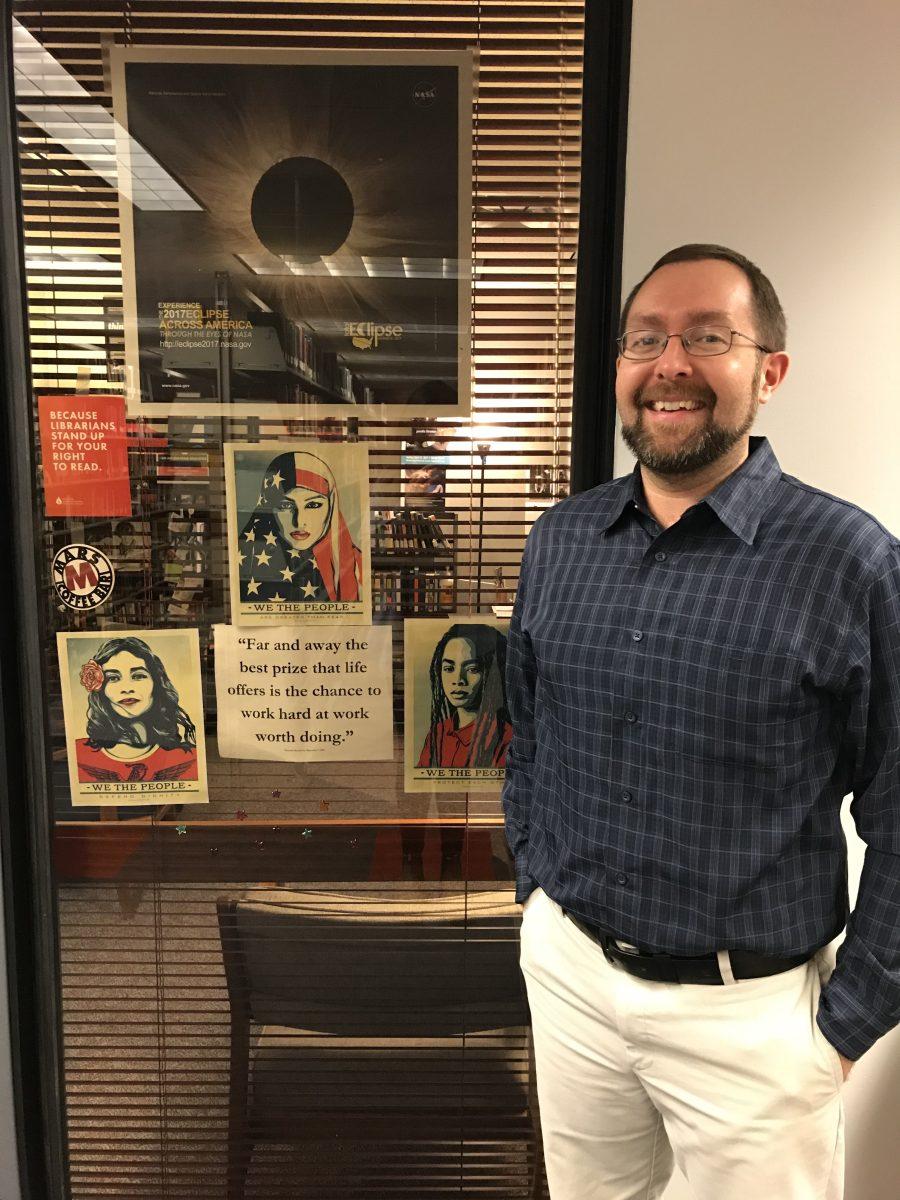STEM librarian and assistant professor of librarianship Dan Chibnall has been a friendly face around Cowles Library since he first started working here in 2016.
However, the St. Louis native never expected he’d make Des Moines his permanent home. The decision was more of a twist of fate due to a particularly catastrophic natural disaster.
After completing his undergraduate work at Knox College in Galesburg, Illinois and his graduate work at the University of Missouri at Columbia, Chibnall and his wife, a native Iowan, decided to branch out of the Midwest for a while. To their delight, Chibnall soon scored a library job in New Orleans, Louisiana. It was the summer of 2005.
On Aug. 29, about two months after the Chibnalls settled into their new home, Hurricane Katrina hit the city. Luckily, they had the resources to leave a few days before the storm was at its worst.
“That was a very harrowing time in our lives,” Chibnall said. “We were very lucky, and we were privileged because we were able to make it out, we had family and friends we could rely on. Not everybody had that.”
When they returned to retrieve their personal belongings about a month later, Chibnall recalls their disbelief at the scenes of devastating impact.
“Did you ever have one of those doll houses when you were a kid that opened up, and you could see the split level?” said Chibnall. “It was like that. Houses just ripped in half … I can’t even describe it. Mountains of refrigerators. Mountains of mattresses. Mountains of microwaves. And just junk, everywhere.”
While staying with his wife’s parents in Des Moines, Chibnall worked for the Des Moines Public Library and then for Grand View University. They eventually decided Iowa seemed like home, and they’ve been here ever since.
Chibnall just finished teaching a J-term course titled Fake News, Filters, and Falsehoods: Navigating Information Overload in the 21st Century. He said he’s been teaching bits and pieces of this course for a few years, but it seemed especially timely to compile the bits and pieces into a full subject immersion.
“I often like to make the analogy that we make decisions every day about what we put into our bodies food-wise, but we often don’t think about what we put into our minds information-wise. We just consume it,” Chibnall said. “Do we just seek out things that reinforce what we already know? … I tell my students, ‘You have to be aware of your own privilege. You have to be aware of your own bias.’”
Consciously thinking about information intake has helped Chibnall himself as well, and he said he periodically rotates the sources from which he receives his information.
Chibnall describes himself as very extroverted. He loves to meet new people. In his free time, he volunteers at the Drake Adult Literacy Center and the Science Center of Iowa, as he is avidly intrigued by everything space and astronomy.
One of his greatest passions is travel, and Chibnall and his wife try to take trips as often as possible. His favorite place he’s visited is Iceland, and they plan to visit Greenland this summer. He also loves to cook, watch the St. Louis Cardinals play baseball and spend time running or biking in various state and national parks.
He also loves to read, of course, and his favorite authors include Margaret Atwood and science fiction writers Octavia Butler and Kim Stanley Robinson.
“Of course, I have a special place in my heart for Harper Lee’s ‘To Kill a Mockingbird,’ but I think a lot of Americans do,” Chibnall said.
Clearly, Chibnall’s interests span all across the board. He loves his job because it gives him the freedom to pursue them as he wishes.
“I like to talk to people, I like to get to know people, I like to help people … I didn’t want to be locked in on one subject for the rest of my life,” Chibnall said. “As a librarian, you can work with people, students and faculty from all across campus and you can also still teach, but you aren’t locked in to necessarily one department. You’re talking to students about history or science or art.”
For those interested in information literacy, Chibnall will teach the LIBR 081 course titled Communicating Science: Bringing Scientific Literacy to the Public this spring.







